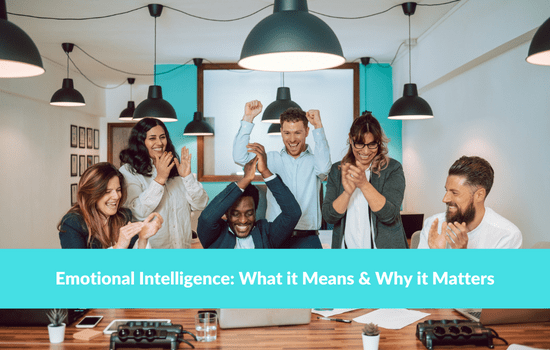Are you wondering why emotional intelligence has been such a hot topic lately? We discuss what it means and why developing these skills is critical for success.
The Advantages of Emotional Intelligence and How You Can Utilize It

Emotional intelligence (EI) is catching on like wildfire! Its relevance to personal and professional success is unparalleled, so it's no wonder it's such a hot topic. It's also why I thought it beneficial to outline what it is and why it matters.
Peter Salovey and John D. Mayer developed emotional intelligence as a psychological theory in the 1990s. They define it as "the ability to perceive emotions, to access and generate emotions so as to assist thought, to understand emotions and emotional knowledge, and to reflectively regulate emotions so as to promote emotional and intellectual growth."
EI is gaining more popularity and interest than ever because it is equally or more important than IQ. Organizations that want to develop their employees and business frequently ask me to provide training and workshops on increasing their emotional intelligence.
Emotional Intelligence: The Other Kind of Smart.
EI is often called "the other kind of smart."
It's also the number one predictor of success, both personally and professionally. We all know someone academically brilliant or "book smart." Yet, those same people are (often) socially unskilled.
EI is an individual's ability to recognize, understand, and manage their feelings and those of others. After all, learning how to communicate one's emotions effectively while interpreting and responding to others is crucial to success. Many don't realize the power of emotion, which is why I write about it in my book, The Power of Emotion.
Interesting Statistics About Emotional Intelligence.
- 90% of top performers have high EI.
- EI matters twice as much as technical knowledge.
- 70% of individuals do not handle conflict or stress effectively.
- Only 36% of individuals understand emotions as they occur.
- Just 15% of individuals feel respected and valued by their employers.
Why Does Emotional Intelligence Matter?
EI matters because it is crucial in various aspects of life. Here are a few reasons why:
- Personal well-being: EI helps individuals navigate their emotions, leading to better self-awareness, self-regulation, and improved mental health. It enables individuals to handle stress, make sound decisions, and build healthier relationships.
- Social relationships: People with high emotional intelligence can empathize with others, understand their perspectives, and effectively communicate and collaborate. These skills foster healthier relationships, enhance teamwork, and reduce conflict.
- Leadership and professional success: EI benefits those in leadership positions. It allows leaders to understand and motivate their team members, manage conflicts, and make decisions that consider the emotions and needs of others. It also helps in building rapport with colleagues, clients, and stakeholders.
- Conflict resolution: EI equips individuals with the skills to navigate conflicts and disagreements constructively. Individuals can find mutually beneficial solutions, build consensus, and maintain positive relationships by understanding emotions and perspectives.
- Adaptability: In today's rapidly changing world, EI helps individuals adapt to new environments, handle ambiguity, and cope with challenges. It promotes resilience and enhances the ability to learn and grow from experiences.
If you want to learn more about developing social skills, take a look at this post, where I share the unlimited benefits of having social awareness at work.
The exciting news is we can develop our emotional intelligence. Our brain is like plastic. It's highly malleable and allows us to retrain ourselves. Brain plasticity is a common term used by neuroscientists. It refers to the brain's ability to change at any age. And unlike IQ, EI isn't fixed at birth.
Ever heard the saying, 'You can't teach an old dog new tricks?' IT'S NOT TRUE; you can, due to neuroplasticity! - Linda Marshall, Author & Marshall Connects President
As I mentioned, you can develop your EI skills daily for success; you just need a plan. In this one-day intensive workshop, you will create new insights and an action plan for elevating your leadership effectiveness using critical components of EI. We offer customized EI training, both in-person and online. If you're interested in our Emotional Intelligence Assessments and Coaching, contact us today!
This article was originally published on June 24, 2017, and has been updated (July 2023).
More Motivational Reads Here »

















